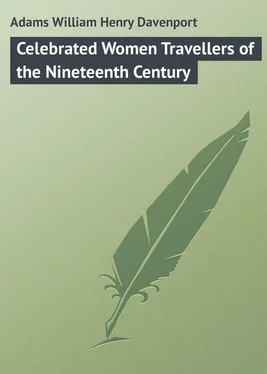William Adams - Celebrated Women Travellers of the Nineteenth Century
Здесь есть возможность читать онлайн «William Adams - Celebrated Women Travellers of the Nineteenth Century» — ознакомительный отрывок электронной книги совершенно бесплатно, а после прочтения отрывка купить полную версию. В некоторых случаях можно слушать аудио, скачать через торрент в формате fb2 и присутствует краткое содержание. Жанр: foreign_prose, foreign_language, на английском языке. Описание произведения, (предисловие) а так же отзывы посетителей доступны на портале библиотеки ЛибКат.
- Название:Celebrated Women Travellers of the Nineteenth Century
- Автор:
- Жанр:
- Год:неизвестен
- ISBN:нет данных
- Рейтинг книги:4 / 5. Голосов: 1
-
Избранное:Добавить в избранное
- Отзывы:
-
Ваша оценка:
- 80
- 1
- 2
- 3
- 4
- 5
Celebrated Women Travellers of the Nineteenth Century: краткое содержание, описание и аннотация
Предлагаем к чтению аннотацию, описание, краткое содержание или предисловие (зависит от того, что написал сам автор книги «Celebrated Women Travellers of the Nineteenth Century»). Если вы не нашли необходимую информацию о книге — напишите в комментариях, мы постараемся отыскать её.
Celebrated Women Travellers of the Nineteenth Century — читать онлайн ознакомительный отрывок
Ниже представлен текст книги, разбитый по страницам. Система сохранения места последней прочитанной страницы, позволяет с удобством читать онлайн бесплатно книгу «Celebrated Women Travellers of the Nineteenth Century», без необходимости каждый раз заново искать на чём Вы остановились. Поставьте закладку, и сможете в любой момент перейти на страницу, на которой закончили чтение.
Интервал:
Закладка:
"It was decided that we should take with us four porters loaded with provisions, ladders, ropes, and pick-axes; that towards evening I should start for Interlachen with Pierre and Jaun, and that the other guides should await me at Grindelwald. Then we separated with the friendly greeting, 'Au revoir.'
"Scarcely had the sun dropped below the horizon, streaked with long bars of fire, when I took my solitary seat in an open carriage. Peter occupied the box. We traversed the walnut-tree avenues of Interlachen and its smiling gardens. We followed the banks of the pale Lütschina, which bounds through the midst of abrupt rocks. Clouds accumulated on the sky. Soon we heard the distant roar of thunder. We passed into the presence of colossal mountains, whose rugged peaks rose like inaccessible fortresses. On turning round, I could see nothing in the direction of Interlachen but gloomy vaporous depths, impenetrable to the eye. Nearer and nearer drew the thunder, filling space with its sonorous voice. The wind whistled, the Lütschina rolled its groaning waters. The spectacle was sublime. Night gathered in all around, and the vicinity of Grindelwald I could make out only by the lights in the châlets scattered upon the hill.
"I had scarcely entered beneath the hospitable roof of the hotel of the Eagle, before the rain fell in torrents, like a waterspout. I elevated my soul to God. At this moment the thunder burst, the avalanches resounded among the mountains, and the echoes a thousand times repeated the noise of their fall.
"The stars were paling in the firmament when I opened my window. Mists clothed the horizon. The rushing wind soon tore them aside, and drove them into the gorges, whence descend, in the shape of a fan, the unformed masses of the lower glacier, soiled with a blackish dust.
"The storm of the preceding evening, those dense clouds which gave to the Alps a more formidable aspect than ever, the well-meant remonstrances of the herdsmen of the valley, all awakened in the heart of my guides a hesitation not difficult to understand on the part of men who feared the burden of a great responsibility. They made another effort to shake my resolution. They showed me a black tablet attached to the wall of the church which crowns the heights: —
Aimé Munon, Min. du S. Ev.
Tomba dans un gouffre
De la Mer de Glace.
Ici repose son corps,
Retiré de l'abîme.
"I said to Pierre, after glancing at this pathetic inscription, 'The soul of this young man rests in peace in the bosom of the Everlasting. As for us, we shall soon return here to give thanks to God.'
"'Good!' replied Pierre; 'that is to say, nothing will make you draw back.'
"He rejoined his companions, and I went to shut myself up in my chamber.
"The deep solitude around me had in it something of solemnity. Before my eyes the Wetterhorn raised its scarped acclivities; to the right, the masses of the Eiger, to the left, the huge Scheideck and the Faulhorn. Those gloomy mountains which surrounded me, that tranquillity troubled only by the rash of the torrent in the valley and by an occasional avalanche, all this was truly majestic, and I felt as if transported into a world where all things were unlike what I had seen before. My mind had seldom enjoyed a calm so complete.
"I had not the patience to wait for morning. Before it appeared, I was on foot. I breakfasted in haste, and assumed my masculine dress, to which I found it difficult to grow accustomed. I was conscious of my awkwardness, and it embarrassed all my movements. I summoned Pierre, and asked him if I could by any means be conveyed as far as the valley. He sent, to my great satisfaction, for a sedan-chair. Meanwhile, I exercised myself by walking up and down my room, for I feared the guides would despair of me if they saw me stumble at every step. I was profoundly humiliated, and only weighty reasons prevented me from resuming my woman's dress. At last I bethought myself of an expedient. I made a parcel of my silk petticoat and my boots ( brodequins ), and gave it to a porter, so that I might resort to them if I should be completely paralyzed by those accursed garments which I found so inconvenient.
"We had to wait until eight o'clock before taking our departure. The sun then made its appearance, and the mountains gradually threw off their canopy of mist. Having wrapped myself in a great plaid, I took my seat in the sedan-chair and started, accompanied by four guides, four porters, and a crowd of peasants, among whom was a Tyrolean. All sang merrily as they marched forth, but those who remained looked sadly after us. It was the 10th of June, 1855.
"We marched without any attempt at order, and the people of Grindelwald carried our baggage as a relief to our porters. The sun was burning. The peasants took leave of us as soon as we struck the path which creeps up the Mettenberg, skirting the 'sea of ice.' Only the Tyrolean, accompanied by his young guide, remained with us. He said that curiosity impelled him to follow us as long as he could, that he might form some idea of the way in which we were going to get out of the affair. He sang like the rest of the caravan, his strong voice rising above all.
"It was the first time I had seen the immense glacier popularly called 'La Mer de Glace.' Through the green curtains of the pinewoods, I gazed upon the masses rising from the gulf, the depths of which are azure-tinted, while the surface is covered with dirt and blocks of snow. The spectacle, however, did not impress me greatly, whether because I was absorbed in the thought of gaining the very summit of the Alps, or because my imagination felt some disappointment in finding the reality far beneath what it had figured.
"I descended from my sedan-chair when we arrived at an imprint in the marble rock known as 'Martinsdruck.' The gigantic peaks of the Schreckhorn, the Eiger, the Kischhorn, rose around us, almost overwhelming us with their grandeur. To the right, the Mittelegi, a spur of the Eiger, elevated its bare and polished sides. Suddenly the songs ceased, and my travelling companions uttered those exclamations, familiar to Alpine populations, which re-echoed from rock to rock. They had caught sight of a hunter, gliding phantom-like along the steep ascent of the Mittelegi, like a swallow lost in space. But in vain they pursued him with cries and questions; he continued to move silently along the black rock.
"At length we descended upon the glacier. They had abandoned me to my own resources, probably to judge of my address. I was more at ease in my clothes, and with a sure step I advanced upon the snow, striding across the crevasses which separated the different strata of ice. By accident, rather than by reflection, I looked out for the spots of snow and there planted my feet. Later I learned that this is always the safest route, and never leads one into danger. The Tyrolean took leave of us, convinced at last that I should get out of the affair. As for the guides, they gave vent to their feelings in shouts of joy. They said that, in recognition of my self-reliance, they would entrust to me the direction of the enterprise. After crossing the Mer de Glace, we began to climb the steep slopes of the Ziegenberg.
"For a long time the songs, a thousand times repeated, continued to answer each other from side to side of the glacier. Then we could hear no longer the voice of men, nor the bell of the church of Grindelwald, whose melancholy notes the wind had hitherto wafted to us. We were in the bosom of an immense wilderness, face to face with Heaven and the wonders of Nature. We scaled precipitous blocks of stone, and left behind us the snowy summits. The march became more and more painful. We crawled on hands and feet, we glided like cats, leaped from one rock to another like squirrels. Frequently, a handful of moss or a clump of brushwood was our sole support, where we found no cracks or crevices. Drops of blood often tinted, like purple flowers, the verdure we crushed under foot. When this was wanting we contrived to balance ourselves on the rock by the help of our alpenstocks, having recourse as seldom as possible to one another's arms, for fear of dragging the whole company into the abyss. Hundreds of feet below us glittered the deep crevasses of the glacier, in which the rays of the sun disported. The cold winds, blowing from the frozen heights, scarcely cooled our foreheads. We were streaming with perspiration, but our gaiety increased, instead of diminishing, with the dangers. When we came to a stretch of granite, our speed was doubled, and whoever first set foot upon it would announce the fact to the others. There we slipped but seldom, and by assisting one another, we could walk erect and more quickly. Bohren the younger, who was one of our porters and the youngest of the company, continued his merry song. In moments of peril his voice acquired a decided quaver, but he never paused in his march or in his cadences, and never fell back a step.
Читать дальшеИнтервал:
Закладка:
Похожие книги на «Celebrated Women Travellers of the Nineteenth Century»
Представляем Вашему вниманию похожие книги на «Celebrated Women Travellers of the Nineteenth Century» списком для выбора. Мы отобрали схожую по названию и смыслу литературу в надежде предоставить читателям больше вариантов отыскать новые, интересные, ещё непрочитанные произведения.
Обсуждение, отзывы о книге «Celebrated Women Travellers of the Nineteenth Century» и просто собственные мнения читателей. Оставьте ваши комментарии, напишите, что Вы думаете о произведении, его смысле или главных героях. Укажите что конкретно понравилось, а что нет, и почему Вы так считаете.












